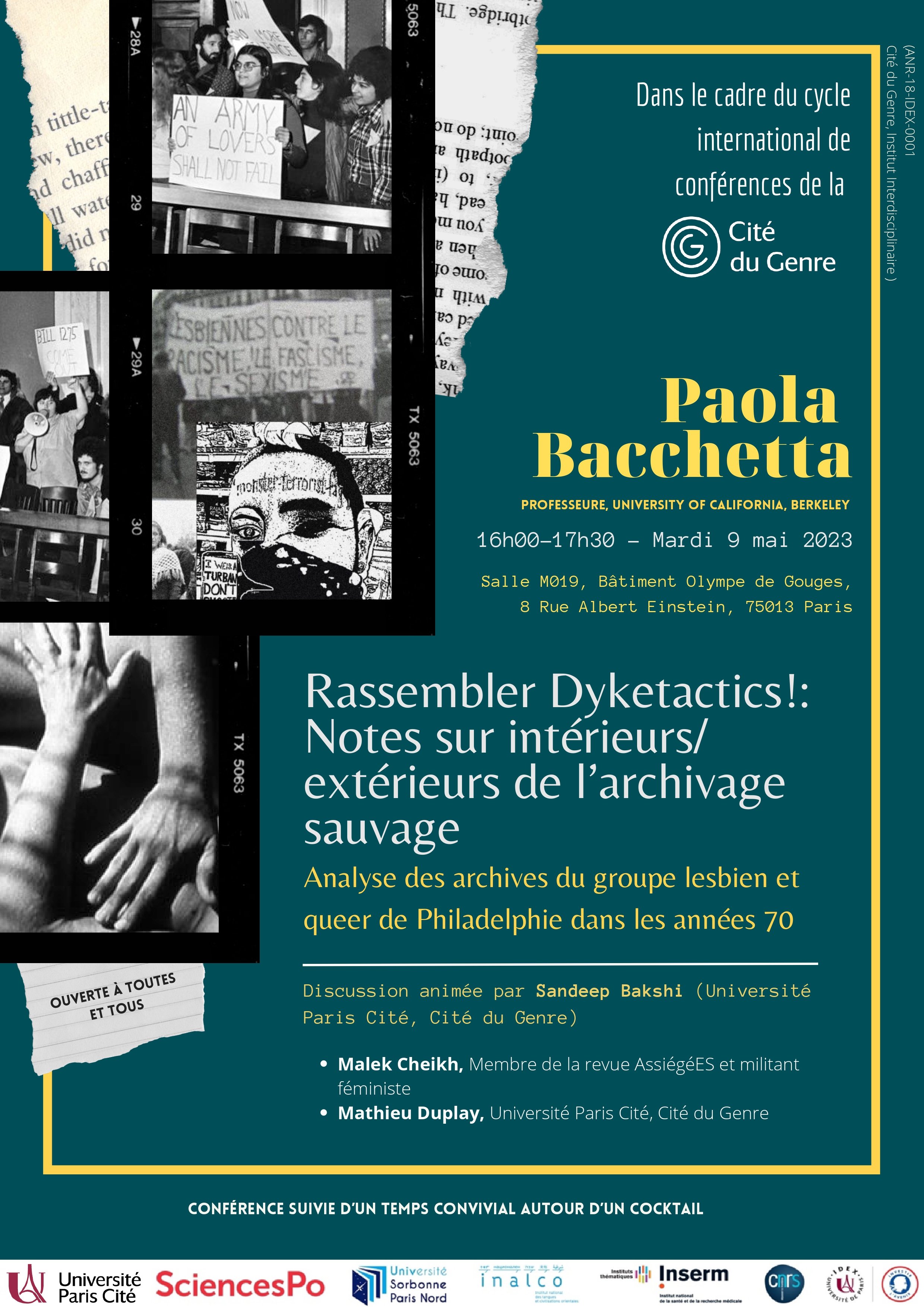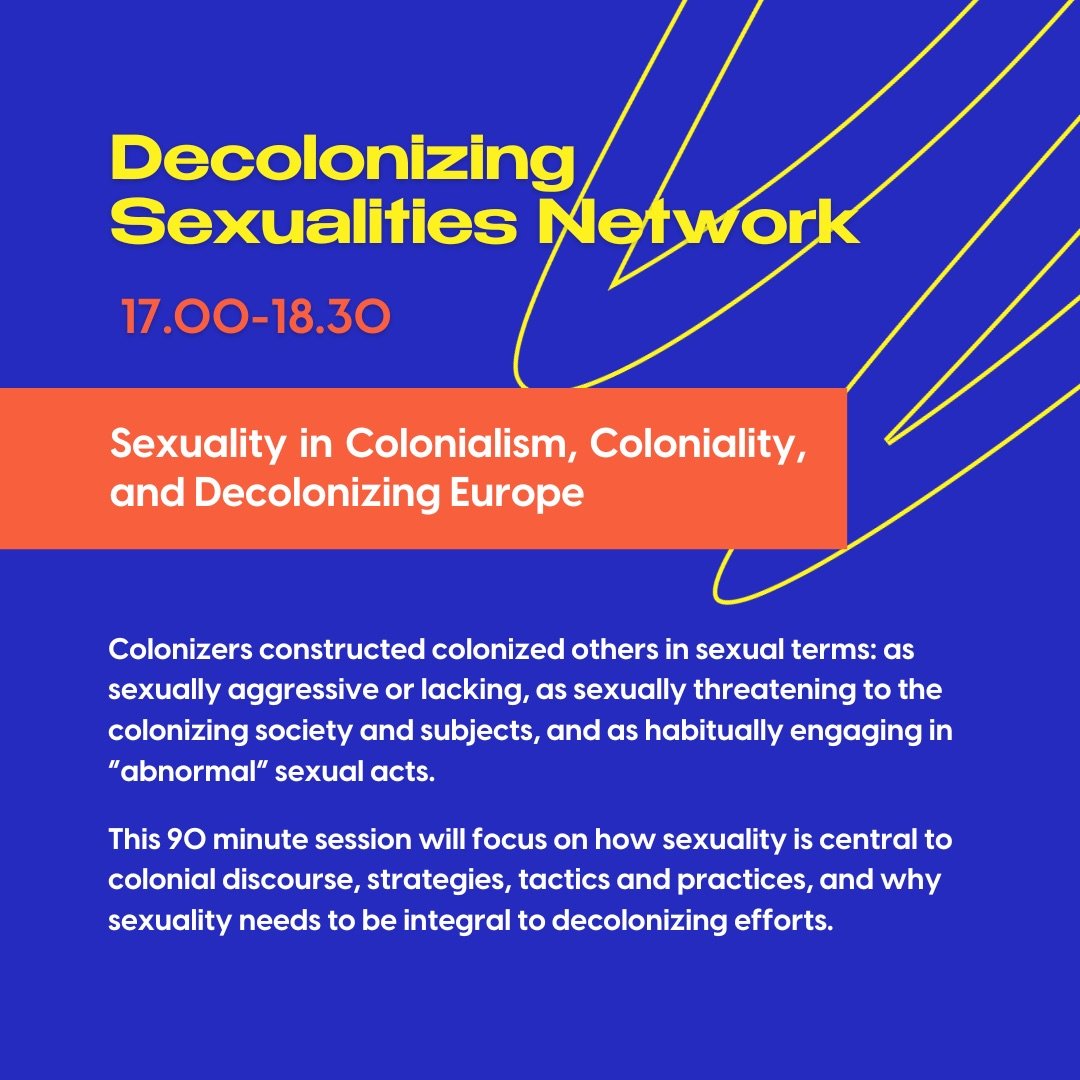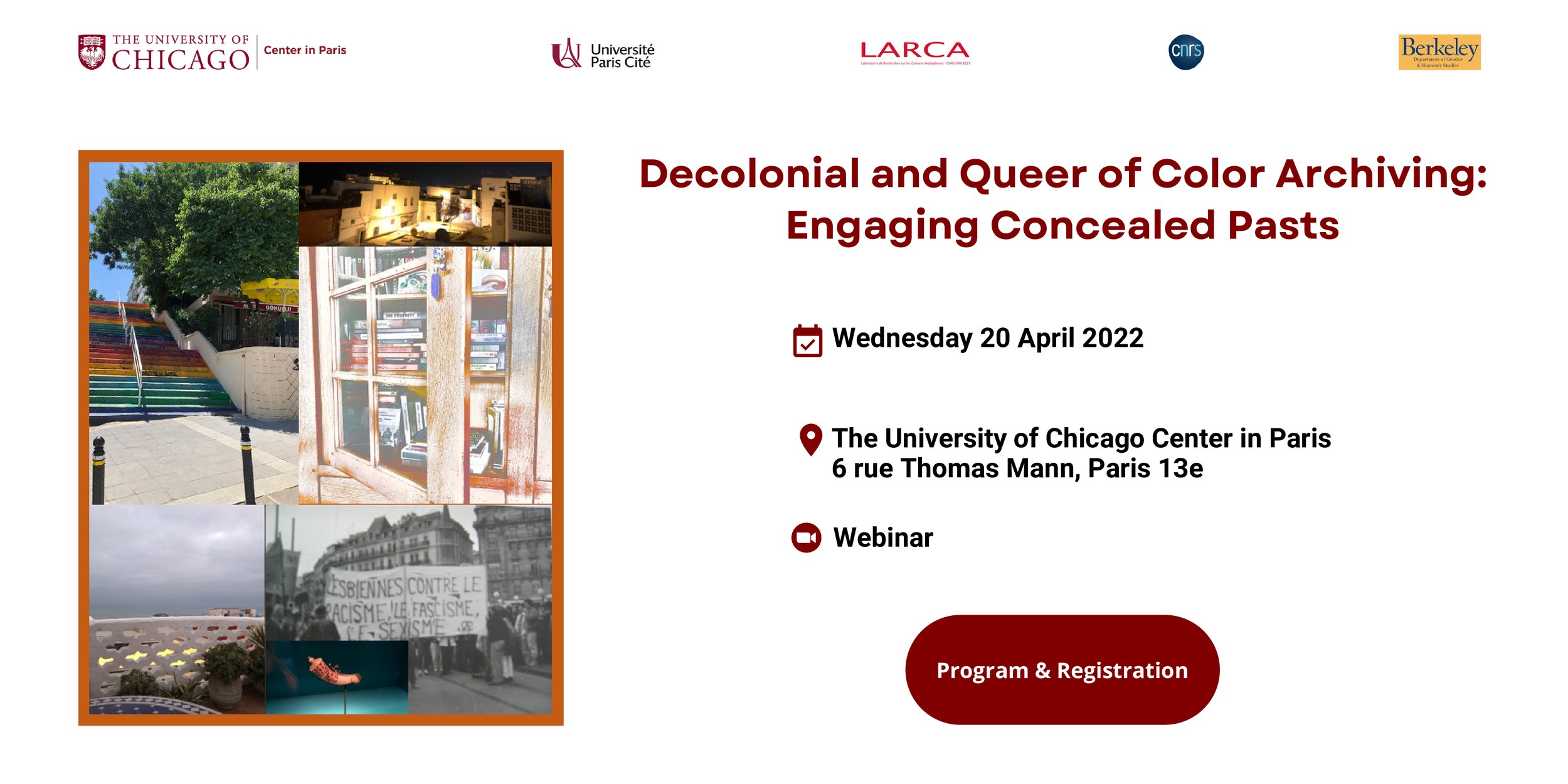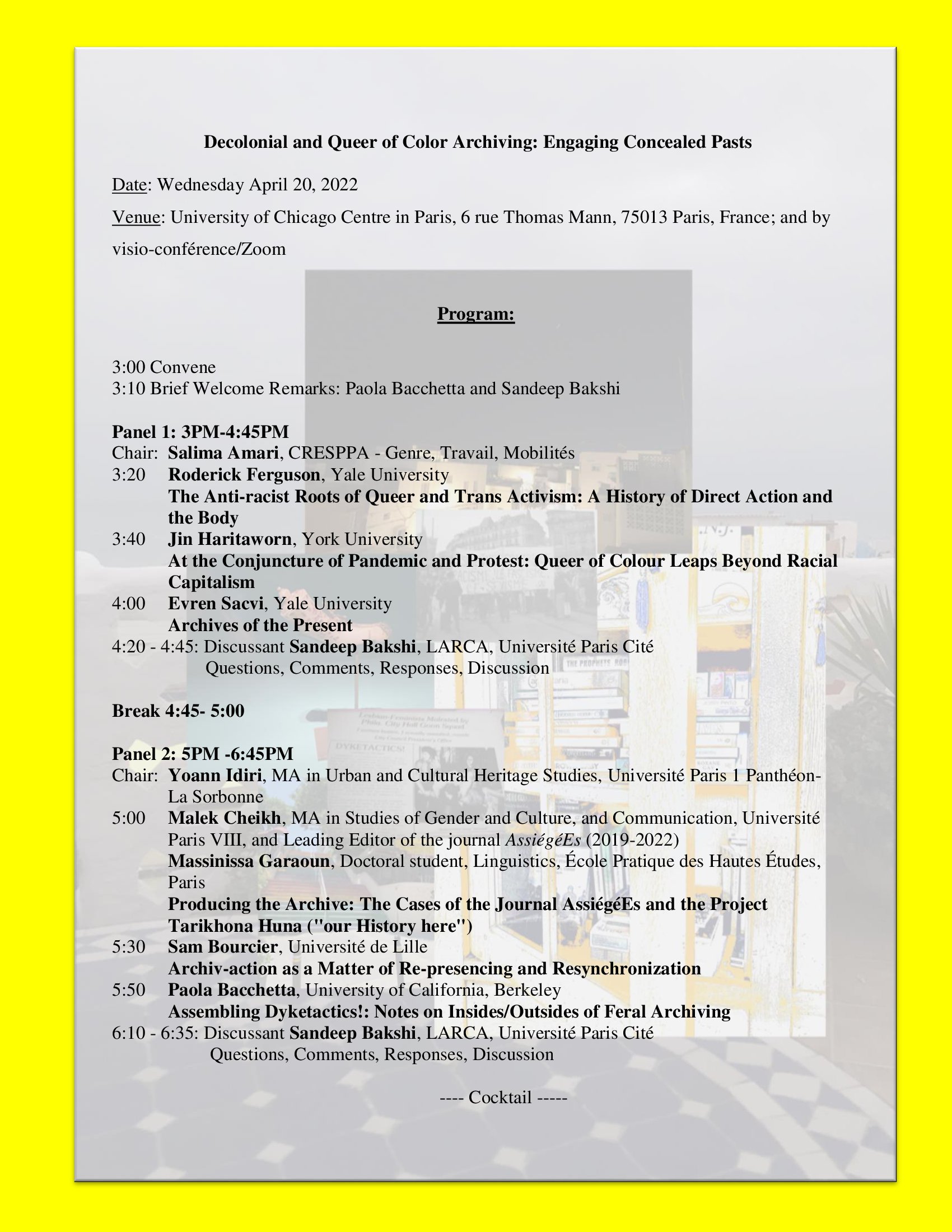DSN@15
*
DSN@15 *
Vegan Picnic, Paris
8 June 2025
Parc des Buttes-Chaumont
12.00 pm onwards
Decolonizing Gender and Sexualities
11 March 2025
University of California, Berkeley
DECOLONIAL EUROPE DAY 9 May 2024
Panel DSN: Sexuality in Colonialism, Coloniality, and Decolonizing Europe
Full programme: https://decolonial.eu/programme/
Transnational Archiving of Sexualities: Engaging Plural Pasts
A Project by Decolonizing Sexualities Network, with the France-Berkeley Fund
SCHEDULE OF PUBLIC EVENTS MAY 2023
Friday 5th May 2023 – 14h00
Lectures Transfrontalières
Collective readings of excerpts from French (and English) editions of Gloria Anzaldúa Borderlands/La Frontera: The New Mestiza (with preface author Paola Bacchetta and translators Nino S. Dufour and Alejandra Soto-Chacón)
Academics, activists and artists are invited to participate
Library Research Room, Université Paris VIII, 2 rue de la Liberté - 93526 Saint-Denis
Organized by Groupe d’études politiques en réseaux
Many thanks to Béatrice Rettig
Co-sponsored by: Decolonizing Sexualities Network; Séminaire libre des jeunes chercheur·e·s du LLCP-Paris VIII; Éditions Cambourakis
Tuesday 9th May 2023 – 16h00-17h30
Conférence – Paola Bacchetta, University of California, Berkeley, hosted by the Cité du Genre, Université Paris Cité
Rassembler Dyketactics!: Notes sur intérieurs/extérieurs de l’archivage sauvage
Analyse des archives du groupe lesbien et queer de Philadelphie dans les années 70
Discutant·e·s : Malek Cheikh, Membre de la revue AssiégéES et militant féministe
Mathieu Duplay, Professeur, LARCA/Université Paris Cité
Salle M019, Bâtiment Olympe de Gouges
8 Rue Albert Einstein/Place Paul Ricoeur, 75013 Paris
Contact: Sandeep Bakshi (sandeep.bakshi@u-paris.fr)
Co-organized by Cité du Genre and Decolonizing Sexualities Network
Wednesday 10th May 2023 – 17h00-19h00
Roundtable Lesbian, Queer and Trans of Color and Decolonial Archiving
Mel Chen (Associate Professor, University of California, Berkeley), Lisbet Tellefsen (Visiting Archivist, University of California, Berkeley), Paola Bacchetta (Professor, University of California, Berkeley) with Sandeep Bakshi (Associate Professor, LARCA/Université Paris Cité)
Room 127, Bâtiment Olympe de Gouges
8 Rue Albert Einstein/Place Paul Ricoeur, 75013 Paris
Contact: Sandeep Bakshi (sandeep.bakshi@u-paris.fr)
Co-organized by “Empires, Souths, Sexualities”, LARCA, Université Paris Cité and Decolonizing Sexualities Network
Hybrid event.
Registration link: https://u-paris.zoom.us/meeting/register/tZUuc--vpzMjEtRg1JTZEmPBN9vLtEqTR2N8
Saturday 13th May 2023 – 16h00-18h00
Archiver comme Lisbet Tellefesen
Contact: Sam Bourcier (sambourcier1@gmail.com)
Collectif Archives LGBTQI
Amphithéâtre B, 13 rue Santeuil, 75005 Paris, Métro Censier-Daubenton
Organized by Decolonizing Sexualities Network
Events organized and co-sponsored by Decolonizing Sexualities Network.
Many thanks to France-Berkeley Fund, Cité du Genre and LARCA for financial support.
https://fbf.berkeley.edu/publications/transnational-archiving-sexualities-engaging-plural-pasts


PAST EVENTS

Wednesday 20th April 2022
3.00-7.00 pm Paris, France time
Decolonial Queer and Queer of Color Archiving: Engaging Concealed Pasts
University of Chicago Centre in Paris
6 rue Thomas Mann, 75013 Paris, France
Hybrid one-day symposium
This one day transnational symposium aims to place current decolonial queer and queer of color archival theories and practices - that are being developed around the world - in conversation with each other so as to mutually extend our knowledges and to enhance practices of critical queer archiving wherever located. The symposium will ask: what constitutes a decolonial or queer of color archive? Who are and what are our archives for? What kind of materials do we desire to archive and why? What might we hesitate to preserve in archives (i.e. anti-queer and anti-trans violence, queer of color suicide, panic or other affects, etc.)? What are the material possibilities and limitations for our archiving? What epistemic work do our archivings entail? How can queers and allies work together to produce decolonial, anti-capitalist, anti-racist, feminist, queer archives for our times and for futurity?
Decolonial and Queer of Color Archiving: Engaging Concealed Pasts
Footage
Date: Wednesday April 20, 2022
Venue: University of Chicago Centre in Paris, 6 rue Thomas Mann, 75013 Paris, France; and by visio-conférence/Zoom
Program:
3:00 Convene
3:10 Brief Welcome Remarks: Paola Bacchetta and Sandeep Bakshi
Panel 1: 3PM-4:45PM
Chair: Salima Amari, CRESPPA - Genre, Travail, Mobilités
3:20 Roderick Ferguson, Yale University
3:40 Jin Haritaworn, York University
4:00 Evren Sacvi, Yale University
4:20 - 4:45: Discussant Sandeep Bakshi, LARCA, Université Paris Cité
Questions, Comments, Responses, Discussion
Break 4:45- 5:00
Panel 2: 5PM -6:45PM
Chair: Yoann Idiri, MA in Urban and Cultural Heritage Studies, Université Paris 1 Panthéon-La Sorbonne
5:00 Malek Cheikh, MA in Studies of Gender and Culture, and Communication, Université Paris VIII, and Leading Editor of the journal AssiégéEs (2019-2022)
Massinissa Garaoun, Doctoral student, Linguistics, École Pratique des Hautes Études, Paris
5:30 Sam Bourcier, Université de Lille
5:50 Paola Bacchetta, University of California, Berkeley
6:10 - 6:35: Discussant Sandeep Bakshi, LARCA, Université Paris Cité
Questions, Comments, Responses, Discussion
- Cocktail -
Panel 1
Roderick A. Ferguson
The Anti-racist Roots of Queer and Trans Activism: A History of Direct Action and the Body
Abstract : This talk analyzes how the histories of anti-racist protest in the U.S. provide an unread genealogy of direct action’s relationship to the body in queer and trans activism. We are at a moment in scholarship and organizing that suggests those links; this talk is a first-step toward theorizing and historicizing those connections through the body as a generator for political insurgency across a wide variety of struggles.
Bio : Roderick A. Ferguson is the William Robertson Coe Professor of Women’s, Gender, and Sexuality Studies and American Studies at Yale University. He is the author of One-Dimensional Queer (Polity, 2019), We Demand: The University and Student Protests (University of California, 2017), The Reorder of Things: The University and Its Pedagogies of Minority Difference (University of Minnesota, 2012), and Aberrations in Black: Toward a Queer of Color Critique (University of Minnesota, 2004).
Jin Haritaworn
At the Conjuncture of Pandemic and Protest: Queer of Colour Leaps Beyond Racial Capitalism
Abstract:
As in previous crises, queer, antiracist and other self-organized movements are leading the development of new societal visions during COVID-19. This talk analyzes media reports and policies on COVID in conversation with interviewed activists in Berlin and arrives at a critique of a necropolitical COVID paradigm that treats Black people, migrants and people of colour as infectious rulebreakers – as risks rather than risk groups. Nevertheless, it is at the conjuncture of pandemic and protest that new possibilities are being forged. Examples for this include the pods, bubbles and care collectives that have arisen in queer communities, as well as the mass antiracist organizing that has happened throughout the pandemic. Labelled superspreader events by media and politicians, these acts of care and collectivity were both sites of innovation and products of older transnational archives, which prepare us for revolutionary leaps (Combahee River Collective).
Bio: Jin Haritaworn was raised on queer of colour kitchen tables in London and Berlin. After getting their academic education in Britain they held positions there and in Finland. Ten years ago, they moved to Toronto/Tkaronto/Three Fires Territory, where they are now Associate Professor at York University. Their publications include two monographs (Queer Lovers and Hateful Others: Regenerating Violent Times and Places, The Biopolitics of Mixing), numerous articles (e.g. in GLQ, Society&Space, TOPIA: Canadian Journal of Cultural Studies, Behemoth and international journal of urban and regional research) and several edited and co-edited special issues (e.g. in Sexualities and International Feminist Journal of Politics) and book collections. Their last few collections - Marvellous Grounds (Between the Lines), Queering Urban Justice (University of Toronto Press) and the MarvellousGrounds.com blog, co-edited with the Marvellous Grounds collective, aimed to archive the contributions of queer and trans Black, Indigenous and people of colour to social movements in Toronto/Tkaronto. Jin has made forerunning contributions to English and German-speaking debates on queer space, gay imperialism, intersectionality, neoliberal cities, police violence/abolition and trans and queer of colour theories.
Evren Savci
Archives of the present
Blurb:
Archives are often imagined as consisting of material or immaterial, animate or inanimate things of the past. In another, a rarer use of the term archive, scholars (usually amongst themselves) refer to their object of study as an “archive,” imagining the collection that they analyze and theorize from as their archive. It is the relationship of the first and the second use of the term that I would like to reflect on, departing from my own book Queer in Translation’s somewhat strange and unruly archive. These reflections will speak to how one decides what belongs to the archive (especially an unofficial, personal one), how archives and knowledge are both living things that constitute each other, and how making archives of the present is also the work of making historical archives for the future.
Bio: Evren Savcı is Assistant Professor of Women’s, Gender and Sexuality Studies at Yale University. Her first book Queer in Translation: Sexual Politics under Neoliberal Islam (2021, DUP) analyzes sexual politics under contemporary Turkey’s AKP regime with an eye to the travel and translation of sexual political vocabulary. Her second book project turns to the political economy of monogamy. In it, she discusses the establishment of it as a central tenet of civilized sexual morality, and attends to the current neoliberal incorporation of its alternatives and restoration of it distributive logic. Savcı’s work on the intersections of language, knowledge, sexual politics, neoliberalism and religion has appeared in Journal of Marriage and the Family, Ethnography, Sexualities, Political Power and Social Theory, Theory & Event, Journal of Feminist Studies in Religion and GLQ, and in several edited collections. Savcı received her Ph.D. in Sociology from University of Southern California, and her master’s and bachelor’s degrees in Sociology from University of Virginia. Following her Ph.D., she was a postdoctoral fellow at The Sexualities Project at Northwestern (SPAN).
Panel 2
Malek Cheikh and Massinissa Garaoun
Producing the archive: the cases of the journal AssiégéEs and the project Tarikhona Huna ("our History here")
Abstract:
This communication will address our practices of archiving which led us to a book project on sexual and gender minorities in North Africa. First, we will address Assiégées journal - produced by women, queer and trans poc - as an archive. Last year, our issue about transmission was an occasion to address lesbian of color invisibility. By investigating the conditions of production of our journal we are able to address the concrete limits when it comes to considering Assiégées journal as an archive. Then Massinissa will expose his work on Sexual and Gender Minority Languages in North Africa. It gives us practical clues about the challenges of archiving what is at first descrete. As a conclusion we will give a structure to what seems important to us for our book project, to not reproduce what homonationalism and sometimes its critiques reproduce : the naturalization of absences.
Bio: Malek Cheikh graduated from a Master's degree in Gender Studies & in Cultural Studies in the University of Pairs VIII. Malek is the editor in chief of the journal Assiégées which is produced autonomously by women/queer/trans people of color (2019-2022). Their last issue addressed the notion of transmission through different point of views, leading us to question lesbian of color legacy in France & queer of color archive.
Bio: My name is Massinissa Garaoun, I'm a PhD student in linguistics at the Ecole Pratique des Hautes Etudes (EPHE). My work focuses on the description of North African Arabic and Berber varieties. I also work on the description of several Queer Argots practiced by gender and sexuality minorities throughout North Africa; including an archive project called Tarikhona Huna ("our History here"), of Moroccan Queer Languages and Oral Literacy in collaboration with the queer-feminist organization Tanit.
Sam Bourcier
Archiv-action as a matter of Re-presencing and Resynchronization
Bio : Sam Bourcier teaches queer and gender studies at the university of Lille. He founded The Zoo, the first queer collective in France and he is a member of the Collective Archives LGBTQI+ in Paris. He is the author of Queer Zones The Trilogy, Homo INC.orporated, The Triangle and the Farting unicorn. His next book on archives and “Archivaction”, Le Pouls de l’archive, c’est en nous qu’il bat! will be out this year.
Paola Bacchetta
Assembling Dyketactics!: Notes on Insides/Outsides of Feral Archiving
Abstract :
In this talk Paola Bacchetta reflects upon the process of assembling the archive of the 1970s lesbian and queer, anti-colonial, anti-capitalist, anti-racism group in Philadelphia, Dyketactics! Several years ago Bacchetta, a co-founding member of Dyketactics!, was unanimously elected by members as its archivist. She completed the project in November 2021. The talk proposes the notion of feral archiving to address the process of bringing into being this critical, subversive, partially clandestine, fleeting, subalternative archive, and of what can and cannot be domesticated within it, thus the relation between its insides and outsides. What can such an archive include? What must it keep out, forever free in the streets? What sense can this archive make if understood solely within the dominant episteme? How do dominant presuppositions about archival transparency and truth, categories and logics, cloud what is present and absent in the archive? What kind of epistemic work and interpretative procedures might best render this archive intelligible on its own terms?
Bio : Paola Bacchetta is Professor in the Department of Gender and Women's Studies at University of California, Berkeley. She was the first Chair of the Gender Consortium at Berkeley. Her books include: Co-Motion: On Feminist and Queer Solidarities (Forthcoming Duke University Press); Fatima Mernissi For Our Times, c-edited with Minoo Moallem (Forthcoming Syracuse University Press); Global Raciality: Empire, Postcoloniality, and Decoloniality, co-edited with Sunaina Maira, Howard Winant (New York: Routledge, 2019); Femminismi Queer Postcoloniali: critiche transnazionali all’omofobia, all’islamofobia e all’omonazionalismo (co-edited with Laura Fantone, Verona, Italy: Ombre Corte, 2015); Gender in the Hindu Nation (India: Women Ink, 2004); Right-Wing Women (with Margaret Power, New York: Routledge, 2002). She has published over 65 articles and book chapters on transnational feminist and queer theory, decolonial theory, queer movements. She has had visiting positions at Harvard, Ecole des Hautes Etudes en Sciences Sociales, Universite de Paris VII. She currently has research grants with Fulbright and Andrew W. Mellon. See: https://berkeley.academia.edu/PaolaBacchetta
This event is organized by Decolonizing Sexualities Network (DSN) Coordinators Paola Bacchetta and Sandeep Bakshi




